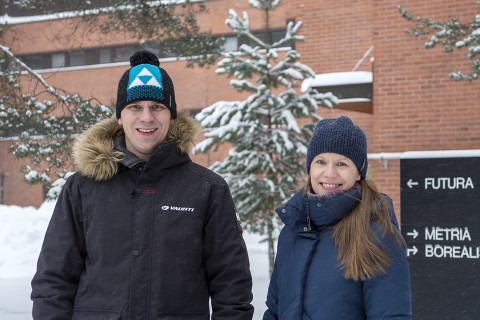The work of a chemist is to solve global problems and to develop new innovations. At its best, the work is a combination of one’s own interests, such as teaching and cross-country skiing.
According to chemistry alumni Johanna and Esa Puukilainen, studying chemistry is a genuine opportunity to solve major challenges, such as climate change. The development of society and the world has been rapid. The planet’s population is growing, and natural resources are depleting, which means that more effective solutions must be found.
“Chemistry is connected to all of this,” the Puukilainens says.
“By studying chemistry, and especially by acquiring a dual qualification, one can ensure one’s employment opportunities in the midst of global challenges. I myself am a good example of this,” says Johanna Puukilainen, who is both a qualified chemist and a teacher.
“The work of a chemist is not just about solving problems. You can incorporate your own interests into your career, which is one of the strengths of chemistry,” says Esa Puukilainen, CEO of the ski industry company Vauhti Speed Ltd.
“The company’s activities encompass the chemical industry and ski wax manufacturing. Recently, we have also begun to import and distribute Fischer’s ski equipment.”
The Puukilainens’ story together dates back to the early 1990s.
“We met at the chemistry department. We are one of the many living examples of how chemistry unites people,” they say.
In upper secondary school, becoming a medical doctor was the primary career alternative for Esa Puukilainen.
“Being a medical doctor runs in my family. However, I didn’t get into medical school, so I polished my skills in my second choice, chemistry. The University of Joensuu was a good alternative, since it was just launching a programme for research chemists.”
“Soon I was very immersed in studying chemistry, thanks to the fact that I was able to integrate my hobby, cross-country skiing, into my studies. Surface chemistry and materials are strongly related to ski maintenance.”
“After obtaining my Master’s degree, I did my doctoral studies in physical chemistry and surface material chemistry.”
Professor Tapani Pakkanen’s support for the young researcher was important, and he defended his doctoral dissertation in 2007. He spent the next seven years at the University of Helsinki as a postdoctoral researcher in inorganic thin films and surface chemistry.
Then he found a new job in the industry sector and the family moved back to Joensuu.
“Having a diverse education has provided me with an opportunity to take on diverse roles,” Puukilainen notes.
Johanna Puukilainen has been interested in natural sciences ever since school.
“In secondary school, I contemplated studies in pharmacy and becoming a pharmacist as one option. However, I got into the degree programme in chemistry right after my matriculation examination. Already then, I had a strong feeling that being a chemist was the thing for me.”
“I also dreamt of studying medical sciences. After all, I’m a person who enjoys being surrounded by people, so I also studied to become a subject teacher alongside writing my Master’s thesis. I really enjoy teaching, and after graduation, I spent ten years in Porvoo as a teacher. When I returned to Joensuu, I did my licentiate thesis and worked in the food and in vitro diagnostics industry.”
“However, I felt a strong calling to teaching, so I became a full-time teacher in chemistry, physics and mathematics. Now I am also planning a doctoral thesis on chemistry teaching.”
“I am very happy and pleased with my choice of career, as few people have this opportunity to acquire both chemist and teacher qualifications. It’s been easy to find employment after graduation.
The study of chemistry left a pleasant memory for the Puukilainens. They enjoyed not only the close-knit student community, excursions, floorball and student parties, but also lab assignments and working with the department’s staff and senior researchers.
“Good education was delivered in many forms, both in the laboratory and on lectures. Although one sometimes had to do organic chemistry syntheses many times before they were successful,” the Puukilainens say.
According to the Puukilainens, broad-based chemistry education opens up many doors.
“Nowadays, the magnitude of things gets easily confused in the media, for example. Chemistry gives tools for understanding what is relevant and what is not, and how much a per mil or a per cent of something really is, to give an example.”
“In the ski wax industry, this can be seen in the banning of one compound, perfluorooctanoic acid (PFOA). PFOA was found in ski waxes only as an impurity of raw material manufacturing, and in our entire annual fluorinated ski wax production, there was only three grams of it. Fluorinated compounds are, of course, bad for nature, and we are looking for alternatives to replace them, but three grams of PFOA cannot do any big harm.”
“Broad-based thinking is also needed, for example, in the electrification of transport and in environmental friendliness. Chemistry education gives tools for this, too.”
The international dimension is strongly visible in the ski wax industry, as two thirds of Vauhti Speed’s sales are exports to all areas that have snow. As a rule, raw materials for the company’s ski waxes are procured in Finland.
“Fischer is a very big partner for us, and in fact more than half of our partners are international, so our working language is English. Our company’s growth has come from exports, which have increased significantly over the past five and six years,” says Esa Puukilainen.
When it comes to ski sports, Finland is a traditional, but small country.
Esa Puukilainen
CEO, Vauhti Speed

According to the Puukilainens, the University of Eastern Finland is a very important player in the Joensuu region, but science is also open and global.
“Collaboration with the university provides us with support for our work, as expert assistance can be found close to home, as well as teaching and research.”
Collaboration with alumni is also highly appreciated on the university’s side.
“The Puukilainens and our other chemistry alumni are extremely important to us: they are part of our interface for societal interaction. Our graduates go on to pursue various careers, to develop education and to do research,” says Professor Mika Suvanto, Head of the Department of Chemistry.
“Finland is a small country, but thanks to our alumni, we have an international network that works on all levels. Expertise in chemistry is needed, for example, in industry, in product manufacturing, and in the work of authorities.
New innovations are constantly sought, and if there's a solution, us chemists will find it.
Mika Suvanto
Head of the Department of Chemistry, Professor

